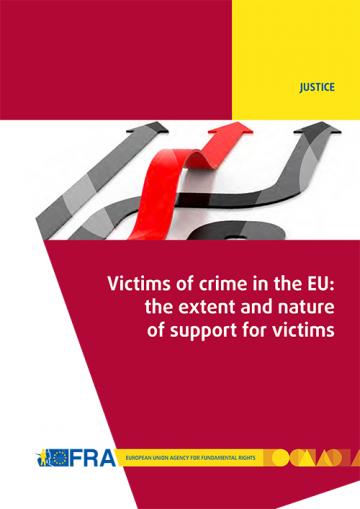More targeted victim support services needed in the EU

Access the report: Victims of crime in the EU: the extent and nature of support for victims >>
“Assistance must be made available to victims before, during and after criminal proceedings – and not only legal support, but also psychological and emotional,” says FRA Director Morten Kjaerum. “In 10 months EU Member States must have transposed the EU Victims’ Directive into national law, and there is still a lot to be done.”
To help ensure effective support for victims throughout the EU, FRA makes a number of suggestions in the report, for example:
- EU Member States need to ensure the provision of targeted support services, including trauma support and counselling, for victims with specific needs, for example victims with a disability, victims of sexual violence, or irregular migrants who become victims of crime.
- EU Member States must ensure they comply with obligations in the Victims’ Directive to train police officers and court staff, and make available the additional resources needed to implement these measures.
- Bureaucratic hurdles should be removed so that legal aid is made available to victims who are party to criminal proceedings in the same way as it currently is to defendants.
- Member States should introduce measures that ensure victims have access to information about their rights and available support services, as well as to relevant information about their case.
- To encourage more victims to come forward and report crimes, EU Member States should ensure that information about victim support is made immediately available by all authorities and public services with which victims come into contact, including the health service.
FRA research has consistently found that underreporting is a major obstacle to ensuring victims have full access to their rights. Targeted and practical victim support systems are a crucial element of any strategy to increase trust in the authorities and increase reporting rates, without which it is impossible to improve the investigation and prosecution of crime. In this regard, the Victims’ Directive, or Directive establishing minimum standards on the rights, support and protection of victims of crime is a big step forward. Member States must transpose the articles of the Directive by 16 November 2015.
The subject of victim support is closely linked to FRA’s other work on access to justice, discrimination and hate crime, and particularly to the findings of the Agency’s large scale surveys of people who are most often victimised. The results of this work can be found in publications such as the LGBT report, discrimination and hate crime against Jews, or Violence against women.
For today’s report, FRA has collected data from all 28 Member States in order to provide information and analysis on current procedures at national level. The publication demonstrates that despite the many challenges, there have been a number of positive developments across Member States. Many of these are listed in the report as promising practices. For example:
- Some EU Member States such as Belgium, Estonia or Finland ensure that victim support organisations are run either directly at police stations or in their immediate vicinity, making referrals easier.
- In several Member States, including Denmark, Poland and the United Kingdom, money is raised for victim support services by means of a fund paid into by people on conviction of a criminal offence.
- Apps have been developed in some Member States such as Spain or Sweden that provide details on court procedure, as well as on locations and contact details.
The report is available here: Victims of crime in the EU: the extent and nature of support for victims
The Victims’ Directive is just one element of the broader Victims’ Package. Two other pieces of legislation that make up the Package will enter into force on 11 January 2015, which ensure crime victims who are granted protection in one EU country will be eligible for similar protection in another Member State.
For further information please contact: media@fra.europa.eu / Tel.: +43 1 580 30 642
Notes to editors:
- The European Union Agency for Fundamental Rights (FRA) is mandated to provide evidence-based advice to EU and national decision makers, thereby contributing to more informed and better targeted debates and policies on fundamental rights.
- Directive 2012/29/EU of the European Parliament and of the Council establishing minimum standards on the rights, support and protection of victims of crime